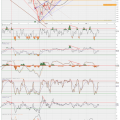Federal Reserve Governor Lael Brainard said Thursday she’s growing more concerned about economic growth, particularly the impact that the global slowdown will have on the United States.
Speaking the same morning that U.S. retail sales numbers came up well short of market expectations, the central bank policymaker said she’s watching the developments in an economy that has otherwise looked strong.
“Downside risks have definitely increased relative to that modal outlook for continued solid growth,” she told CNBC’s Steve Liesman during a “Squawk on the Street” interview.
The Fed said after its January meeting that it would be “patient” regarding further interest rate hikes. Brainard endorsed that approach, particularly considering “crosscurrents” that are building up for growth, especially in the global economy outside the U.S.
“Back in December, I had already noted that crosscurrents were increasing and that tailwinds were dying down, and I think that is even more true today because of those downside risks that are gathering,” she said.
On the Fed’s “patient” policy, she said, “I think we’re in a good place today. I’m comfortable waiting and learning. We want to see the data as it comes in, but you know in terms of let’s be on hold for now while we learn about what’s going on in the economy, I think it’s the right place to be.”
The Fed hiked its benchmark interest rate four times in 2018 and is signaling two more increases this year.
However, Brainard and others have said they want to wait to see how conditions transpire before following through. Brainard said she would weigh “what move, if any, later in the year” would be appropriate.
She also indicated that the Fed probably should be nearing the end of the program to reduce the bond holdings on its balance sheet, which had once stood at $4.5 trillion and is now closer to $4 trillion.
“My own view is that the balance sheet normalization process should probably come to an end later this year,” she said.
Looking at specific areas of concern, Brainard cited the U.S-China trade conflict as well as the uncertain future for Brexit negotiations and China’s economy, though she said “domestic momentum has been pretty solid.”
“We are a very international economy,” she said. “Our financial system in particular has shown itself to be very responsive to earnings abroad, to financial conditions and volatility abroad. So, yeah, I’m very attentive to the international outlook.”
The retail sales numbers, which were the worst in a decade, “caught my eye,” Brainard added, but she said she “didn’t want to make too much” of one month’s numbers considering the strength elsewhere in the economy.
![]()
SOURCE: MarketPulse – Read entire story here.
